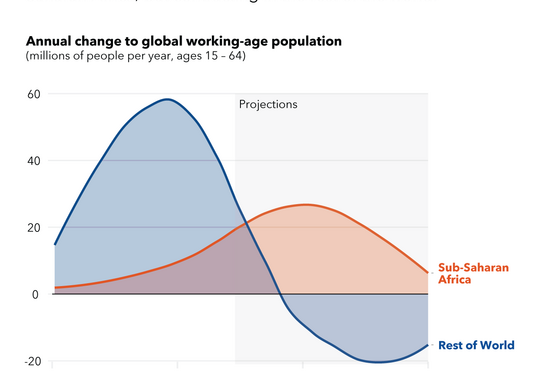Sub-Saharan Africa’s growth requires quality education for growing population
Demographic transition may be the biggest single opportunity for the economies of sub-Saharan Africa, but countries will only be able to enjoy the dividends if they make sufficient investment in education.
The region’s population is poised to double to 2 billion by 2050. As the Chart of the Week shows, that expansion will be led by growth in the working-age population of those ages 15 to 64 that will outpace other age groups and drive almost all the increase.
 |
View the interactive version of the chart here.
Sub-Saharan Africa has made notable progress in expanding access to schools in recent decades, but outcomes in the region still trail those in other emerging market and developing economies, as we explore in our latest Regional Economic Outlook.
Nearly three in 10 school-age children do not attend school. For primary school students, the completion rate is around 65 percent, compared with a world average of 87 percent. And the literacy rate for those ages 15 to 24 is only 75 percent, below the nearly 90 percent rate in other emerging market and developing economies. On top of this, pandemic-related school closures led to learning losses that in some cases reversed years of progress.
One reason for these shortfalls is that government spending on education in sub-Saharan Africa falls short of international benchmarks in several countries. The median education budget was equal to about 3.5 percent of gross domestic product in 2020, which is below the international recommendation of at least 4 percent of GDP. But recent IMF analysis reveals that achieving the key Sustainable Development Goal of universal primary and secondary school enrollment by 2030 may require doubling education expenditures as a share of GDP, including from both public and private funding sources.
Greater spending to improve access is important, but equally important is the effort to ensure that funds are efficiently used. Indeed, for the median country in sub-Saharan Africa, only 15 percent of students in primary and secondary school achieve more than the minimum learning outcome, while teacher training rates have fallen steadily for two decades.
Investment in education provides clear long-term economic gains that more than justify the cost. Greater government spending on education offers economic benefits such as higher productivity and foreign direct investment, as shown in the latest Fiscal Monitor. Governments in sub-Saharan Africa should protect education budgets amid tighter fiscal constraints and the ongoing funding squeeze, and implement best practices in public financial management on raising domestic revenue and ensuring that funds are well-spent.
For their part, donors and international organizations should maintain or expand education funding support across the region. This will ensure the supply of a productive labor force that will be needed more and more urgently by a rapidly aging world, and help the region become one of the world’s most dynamic sources of new demand for consumption and investment.
More broadly, it is critical to better connect the region’s abundant human resources with the abundant capital in advanced economies and major emerging markets. With the right kind of policies—especially in education—we could see sub-Saharan Africa attracting long-term flows of investment, technology, and know-how. And, given rapidly evolving technology and the landscape for jobs, this could unlock the full potential of the region’s young people, better equipping them for the future.







